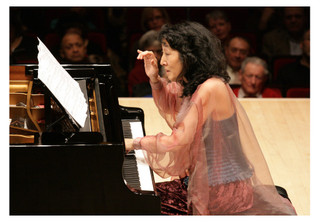|
Back
Transcendence! New York
Isaac Stern Auditorium, Carnegie Hall
04/09/2014 -
Franz Schubert: Piano Sonata in G Major, D. 894
Ludwig van Beethoven: Thirty-three Variations on a Waltz by Diabelli, Opus 120
Mitsuko Uchida (Pianist)

M. Uchida (© Julien Jourdes)
It takes an artist of majestic proportions to radically change one’s position on a major work of music. But Mitsuko Uchida is nothing less than majestic, and in her performance of Beethoven’s Diabelli Variations, she totally transformed my own beliefs.
Until last night, I had felt that Beethoven’s 33 variations, while masterful, while never insignificant, were a kind of tour de force, a feeling that the composer was accomplishing everything possible with the undistinguished waltz by the publisher Diabelli. Mitsuko Uchida, a woman whose artistry never hides her study and innate cerebral feeling, obviously knew differently.
Her performance last night was not a series of variations. She gave it an intensity, a unity, a spiritual feeling asserting that Beethoven was not showing off his prowess, but finding a complete musical portrait through the commonplace skin.
Her first announcement of the theme was taken a as seriously as the first march, as if to say that these were the keys to unlock the doors to enlightenment. After that each variation was not different, but augmented the one before.
With most pianists, Variation seven is punctuated with a repeated motive (two quarter-notes, one full note) on the octave. Ms. Uchida gave them a special accentuation, not harsh, but pointed. But this is the most forward-looking Beethoven, the Beethoven who presaged Schoenberg by literally ignoring conventional keys, and needed that extra drama.
The following variation was as tender as any pianist could perform, a hint of what Chopin would do twenty years later. Her 14th variation, Grave e maestoso had an inner gravity, yes. But Ms. Uchida, even here, imparted a color to each repeated phrase. The fugue of Variations 24 was played with such clarity that one hardly suspected how complex it actually was. As for the 29th Variation, she could have substituted that for any Adagio for the last three piano sonatas, and few would know the difference.
As the work went on, one wasn’t drawn so much to Beethoven’s inspiration for each variation–his wit, fantasy, humor, unnerving suddenness–as his complexity, his inner voice dictating the language.
Ms. Uchida had the understanding to bring the last dozen variations into line with his Grosse Fuge, to the eccentric esoteric feelings which had always been so misunderstood.
And in that finale Minuet, Ms. Uchida gave the ultimate compliment to Beethoven’s mysticism. It was as if the pianist was channeling Beethoven to say, “Well, now you’re heard all the abstractions, skeins, interweavings that the mind can conceive over three years. But guess what? Everything I’ve gave you can be understood equally well by listening to a simple dance.”
As the “Diabelli” opened and closed with unprepossessing moments, so the Schubert Sonata opened and closed...with a whisper.
But the late G Major was, like the Beethoven, a tabula blanca for any great pianist to weave a spell. Ms. Uchida’s greatness–one pianist in the audience called her, without sarcasm, “the High Priestess–is how she builds her music.
That initial whisper was like the voice in a Greek amphitheater which began to resonate, then turn into something grander. Yet Ms. Uchida never actually pushed the Schubert into grand music-making. In Carnegie Hall, this can be challenge, since even all sounds are magnified. But Ms. Uchida managed to keep the sounds relatively intimate. Yet, her digital intensity was less that of a pianist as a violinist, her fingers physically vibrating on the keys.
Nor did she “push” the music. Unlike Beethoven’s organic music-making, Schubert believed in the utter beauty of each phrase. After so many years not as an iconic personality but a pianist of the greatest integrity, Mitsuko Uchida offered the rarest of all traits. She did not “channel” her Beethoven and Schubert. Rather, she gave us her personal ideal of their notes.
Wisely–and as all the musicians in the audience prayed–Ms. Uchida never gave an encore after the Beethoven. Now, she seemed to intimate, I’ve offered you grace, unexpected insights and attempted transcendence. When you go home, see if your vision of the universe has changed.
Harry Rolnick
|